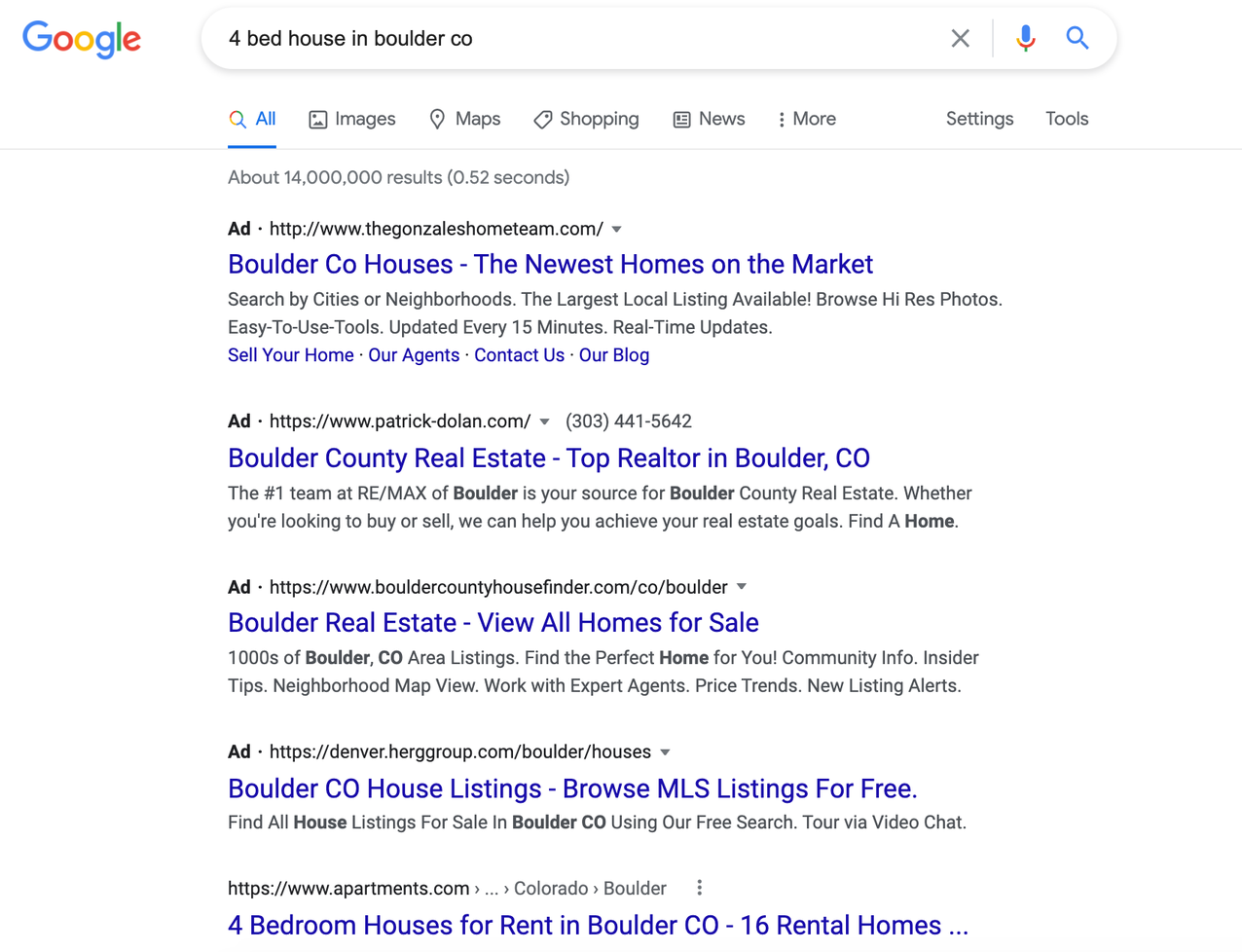The National Association of REALTORS® (NAR) found that 44% of home buyers looked online for properties for sale as the very first step in their home buying process. In contrast, only 16% contacted a real estate agent as the first step. With home buyers almost three times more likely to look online than contact a realtor, your online presence is more important than ever.
If you're not investing in digital real estate marketing, leads will bypass your company and spend more time browsing property marketplace sites instead.
Look beyond organic search
Real estate agents can’t rely on organic search to find new leads and customers. That’s because search results are dominated by online real estate marketplaces like Zillow, Trulia, and Redfin.
According to Ahrefs, Zillow ranks for 10.9 million organic keywords and is the top result for broad searches like “houses for sale” and more specific, localized searches like “houses for sale in Charlottesville.” Add the other marketplace sites into the mix, and it’s near-impossible for real estate businesses to show up in organic search results.
 Source: Ahrefs
Source: Ahrefs
Focus on pay-per-click advertising (PPC)
While marketplace listings may dominate organic search results, you can use paid advertising to beat them to the top spots on search results pages (SERPs). For example, if you search for “4 bed house in boulder co,” the first four results are paid ads:
 Source: Google
Source: Google
In this example, The Gonzales Home Team and Patrick Dolan both show up before any listings from Zillow, Trulia, or other property marketplace sites.
Paid advertising offers other benefits for real estate agents outside of ranking on SERPs, such as:
- Flexibility: It’s easy to turn specific ads on and off, for example, when a property sells or you don’t currently have properties in a certain area.
- Targeted: You can set your ads to target specific keywords, so your ads show up when buyers search for properties like yours.
PPC has a reputation for being an expensive way to generate leads, but in 2019 the average cost-per-click (CPC) for real estate digital marketing ads was just $1.31. For comparison, it was $17.95 for insurance advertising and $4.33 for online banking. Adding PPC to your real estate marketing strategy is a great way to get you seen by many potential home buyers.
Bonus tips: When developing your marketing plan, consider the different ways you can use PPC ads such as driving brand awareness, lead generation, and how it can support other digital marketing tactics.
Video marketing
Video marketing is a channel where real estate agents have an advantage over online marketplaces. Your personal relationship with vendors gives you access to their property and the opportunity to film video walkthroughs and home tours.
Virtual tours are a real estate digital marketing tactic that has accelerated in popularity since the start of the COVID-19, which made it more difficult for buyers and renters to visit properties in person. Zillow’s Consumer Housing Trends Report 2020 found that 51% of prospective renters like live video walkthroughs, and 47% like pre-recorded video tours.
Whether live or pre-recorded, video is an essential digital marketing channel for real estate agents. Wyzowl found that 86% of marketers say video has increased traffic to their website. The same study revealed that people are twice as likely to share video content with their friends than any other type of content - even more than social media posts.
To get the most from video tours, put them behind online forms instead of making them publicly available on your website. To watch the tour, interested viewers will need to enter their contact details, getting you all the information you need to follow up with them afterward.
Bonus tip: Think of ways you can use your home tours as video ads to get people back to your website.
Social media marketing
Social media platforms like Facebook, Instagram, and Twitter are great ways to connect with potential clients by sharing new listings, client testimonials, and events like open houses. Image-based content works really well on social media because a potential home buyer wants to see what a space is like before arranging a viewing or making a purchase.
Writing for Forbes, real estate expert Ralph DiBugnara believes that “for real estate and home professionals, social media may be the best way to brand, advertise, and separate yourself from the competition.”
Many realtors are already making good use of social media. In 2018, the National Association of REALTORS® found that 77% of real estate agents use social media for business, and the Close 2021 Agent Survey found that “44% of agents got a new client thanks to social media in 2020.”
Bonus tip: Create a content marketing calendar and consider what type of content you'll create for every social channel you're on.
Digital marketing makes it easier to generate leads
As we’ve seen, there are many digital marketing channels that real estate agents can use to generate leads. In 2018 the NAR reported that 47% of realtors felt that social media brought in the highest quality leads. But realtors also reported generating high-quality leads from seven other channels, including email marketing, blogs, and digital advertising campaigns:
 Source: National Association of REALTORS®
Source: National Association of REALTORS®
If you’re generating leads from multiple channels, it can be difficult to see the whole picture and track the full customer journey if you have lead data across different tools and platforms. It also becomes more complex when a digital campaign leads to an offline interaction. For example, if a potential buyer clicks from your social media account to view a property listing and then phones your brokerage to arrange a viewing - how do you attribute that lead?
There are a few different options:
- Place trackable phone numbers on each listing or landing page so you can see which landing page they called from.
- Use CallRail’s Facebook Integration, which integrates with Facebook’s advertising pixel to track the calls, texts, and form submissions that came from your Facebook ads. This integration has been updated and expanded, so you can use it to track other social media marketing channels.
- Use forms on property listings or website pages to capture lead information from people looking to book a viewing or watch a video tour. If they call you at a later date, use form tracking to connect digital leads from your online marketing to phone conversations.
For real estate agents, connecting your offline conversations with a client’s online activity can make a real difference to the service you provide. You’ll see which ads bring them to your website and which keywords they were searching for.
You’ll know which listings they look at - and which ones they ignore. All of this information will help you better understand what your client’s looking for and help you get your best properties in front of them for consideration.
Bonus tip: If you need help getting your digital presence right, tapping into a real estate marketing agency can help. Check out our list of agency partners to get started.
Real estate agents need the right tools to compete online
As well as investing in digital marketing, real estate agents need to become familiar with new tools and technologies to adapt to the way people buy homes. A survey from Owners.com found that “36% of home buyers wish their agent leveraged technology to streamline the process.”
Technology can streamline communication and improve the complete house finding and purchasing process for your customers. For example, CallRail’s Lead Center is a business communications and call analytics tool that brings all your calls and texts into a single inbox. The goal? Ensuring that you never miss a lead and can follow up quickly and easily.
Related content: 5 reasons real estate professionals are making the move to Lead Center
Realtors should look at bringing their full marketing and sales processes online to give their customers the best experience and compete with online marketplaces. And adding a tool like CallRail can help you execute your digital marketing strategy more effectively.
Use CallRail to combine digital marketing with offline for your real estate agency
Direct mail, billboard ads, and newspaper ads aren’t where home buyers look anymore. They’re searching online for their new homes, which means real estate agents need to invest in digital marketing or miss out on new leads and customers.
But in the real estate industry, while a customer may find you online, that conversation will soon move offline. To get the best return from your digital marketing investment, you need to connect your online marketing activities with offline touchpoints with your clients.
CallRail gives your team access to a platform that summarizes each interaction with every lead, from their first interaction with an ad to transcribing their call when they phone to book a viewing.

















 Source:
Source: Source:
Source: Source:
Source: